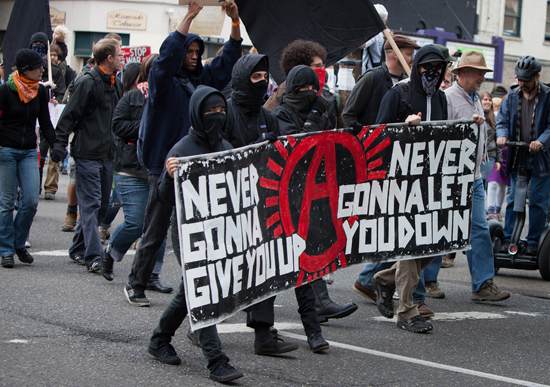
Occupy, Black Bloc, And The Need For Diversity In The Tactics of Dissent8
Posted In Activism,Blog,Politics
by Aaron Colter

As unpopular as black bloc tactics are with the general public following vandalism across the country during May Day, the Occupy movement still needs support from more radical members if it’s to continue to be effective.
First, understand that black bloc isn’t just a handful of young punks dressing in all black to smash windows. Unfortunately, all black bloc members and anarchists have been categorized as people who engage in ill-targeted property destruction. In fact, however, one core idea of black bloc is to act as a wall of protection against potential police brutality at non-permitted marches — a human circle of sacrificial activists who are willing to push the line forward and become the first to defend protestors from riot cops.
There are many who considered the entire notion of having to request a permit in order to protest to be absurd given the language of the Constitution and the rights guaranteed within, and have no desire to be financially liable for any potential expenses appraised by the city following such a protest or march.
Considering the aggressive, indiscriminate, and, at the very least, excessive use of force by police departments against protestors in nearly every major city in America during non-permitted marches, at least some black bloc tactics seem necessary in order to engage in any form of mass public protest today.
Second, while it’s true that the adolescent, mostly male contingent that has been breaking windows of late negatively effects the perception of the Occupy movement as a whole, the aggression and desire for destruction should be understood.
Like in London, when mass looting engulfed portions of the city in the summer of 2011, the smashing of windows in American cities in the spring of 2012 can be seen as natural, albeit ignorant, physical projections of a society that has raised its children under the absent culture of unchecked capitalism and the systemic corruption of nearly all leaders.
But just as both the looting in London and the smashing of windows in America is a failure of society as a whole to install civic responsibility in its youth, it is also a horrendous failure on the part of the Occupy movement for not properly channeling the anger of its more radical protestors into actions that have a more substantial effect towards the goals of abolishing economic injustice.
Furthermore, the misguided actions of the youth today are not necessarily the foundations for a violent and unproductive future. Consider, for example, Bill Ayers.
While aggressive male behavior is a serious issue for public safety in modern culture, there are strong tones of hypocrisy in what is considered acceptable forms of these outburst on the part of society when reflecting on the response of police towards vandals following a sporting event riot compared to the outcry when similar destruction is born out of political outrage.
Those who have become disenfranchised may not see any hope or value in appealing to government representatives inside the legislative process. Still, there are types of vanguardism that could satisfy the primal urges of frustrated individuals unquenched by standard marches, and even some tactics that can be employed by individuals too indifferent to work on projects both within and outside the established system to cause incremental change.
Guidelines for defending against agents of the state, engaging in property destruction, and other radical actions are necessary to encourage the following:
1. That supporters and other members of the community who have not sanctioned such actions are not physically harmed. The idea that provoking police brutality will call attention to the violence of the state is false as such brutality is well-known and often ignored in the mainstream media, and also because it creates a sometimes lasting rift between individuals who might otherwise become collaborators.
2. That targets selected be those that are the worst violators of community sustainability, those that are activity contributing to the demise of workers’ rights, organizations profiting off the erosion of personal liberty, and global corporations continuing to economically exploit underprivileged people.
3. That actions are intelligently focused on spreading a message that will ultimately convert more people to the cause of ending oppression.
By considering the above ideas, a wide range of tactics can be adopted by those who wish to directly confront organizations they see as damning to their well-being through subversion without compromising the security of less extreme individuals or the much-needed populist support.
Breaking the windows of random cars owned by ordinary citizens during a mass gathering is not a tactic that falls within any of the guidelines above. A well-positioned display of graffiti art on a billboard, corporate bank, or police station that is deployed during the night, however, could be a worth-while action depending on the values of the community and possible support the movement could gain from such a tactic.
Marches, rallies, and other large public display of dissidence are ways to encourage the amiable base of current supporters and perhaps a way to change the modes of thinking of potential comrades, but such gatherings and actions are rarely a way to provide concrete alterations in the economic structure of our society.
In the end, if a successful revolution is to happen – one that does not completely destroy the framework of a functioning community, but dynamically changes the systems in which we as humans relate to one another through the exchange of goods and services in harmony with the environment – then a great and diverse amount of support will be needed.
Never in the history of mankind have the rich and powerful given up government control, the means of production, or positions of unearned entitlement willfully. Only a well-coordinated effort on the part of all working class people can alleviate the burden the classist machine now in place. To do so, we much embrace different approaches, but always be mindful of our common goals.
“Anything you can do to rebel against economic tyranny and financial oppression in a nonviolent manner is welcome. You are the leader!”
This phrase was one of the founding calls to action when Occupy Wall Street first began in October of 2011. Now, tactics must advance to ensure actions undermine the structure of global dominance born from the unholy marriage of big business and big government while converting hearts and minds to the cause of personal liberty and communal happiness for all people.
Engage. Educate. Evolve.











